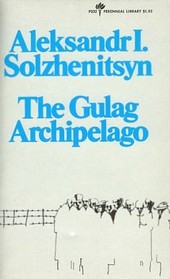Helpful Score: 2
Gulag Archipelago by Alexander Solzhenitsyn, April 13, 2005
Reviewer: Joseph S. Maresca "Dr. Joseph S. Maresca CPA, CISA" (Bronxville, New York USA)
The Archipelago refers to many great ports scattered from the
Bering Strait to Bosporus.There were thousands of small islands where people were transported for varying periods of time.
In addition, there were transit prisons at Ust-Usa and portable
confinements by rail.
Prisoners were subjected to extensive methods of interrogation
including sleep deprivation at night, persuasion, humiliation,
cursing, long periods of standing, sound effects, lighting and
general confusion. Trials were quick and often it was difficult
to access witnesses because they were scattered or in prison
themselves.
People in every station of life were imprisoned for a variety
of reasons- most of them directed to criticism of the State.
Tanya Khodkevich was imprisoned for saying:
" you can pray freely,
But just so G-d alone can hear'
Students were arrested for criticism of the system.
Historians; such as, Platonov and Gotye were arrested.
The Buryat-Monguls were imprisoned in Kazakhstan. Tribal
members of the Northern Caucasus were jailed. People were
convicted by analogy, place of birth/origin or contact
with persons considered "dangerous" to the State.
The work is a testament to the implementation of power in the
Soviet State from Lenin onward. It is written in a
belles lettres style-much like a continuous story. The volume is
highly recommended for a wide audience of college students,
historians, journalists and readers of great literature.
Reviewer: Joseph S. Maresca "Dr. Joseph S. Maresca CPA, CISA" (Bronxville, New York USA)
The Archipelago refers to many great ports scattered from the
Bering Strait to Bosporus.There were thousands of small islands where people were transported for varying periods of time.
In addition, there were transit prisons at Ust-Usa and portable
confinements by rail.
Prisoners were subjected to extensive methods of interrogation
including sleep deprivation at night, persuasion, humiliation,
cursing, long periods of standing, sound effects, lighting and
general confusion. Trials were quick and often it was difficult
to access witnesses because they were scattered or in prison
themselves.
People in every station of life were imprisoned for a variety
of reasons- most of them directed to criticism of the State.
Tanya Khodkevich was imprisoned for saying:
" you can pray freely,
But just so G-d alone can hear'
Students were arrested for criticism of the system.
Historians; such as, Platonov and Gotye were arrested.
The Buryat-Monguls were imprisoned in Kazakhstan. Tribal
members of the Northern Caucasus were jailed. People were
convicted by analogy, place of birth/origin or contact
with persons considered "dangerous" to the State.
The work is a testament to the implementation of power in the
Soviet State from Lenin onward. It is written in a
belles lettres style-much like a continuous story. The volume is
highly recommended for a wide audience of college students,
historians, journalists and readers of great literature.
Helpful Score: 2
Long but very insightful book about the Gulag in the U.S.S.R from the years 1918-1956.
Helpful Score: 1
Fantastic book. This is some tough reading, heavy subject matter, lots of Russian names to follow, and all worth it- very compelling.




